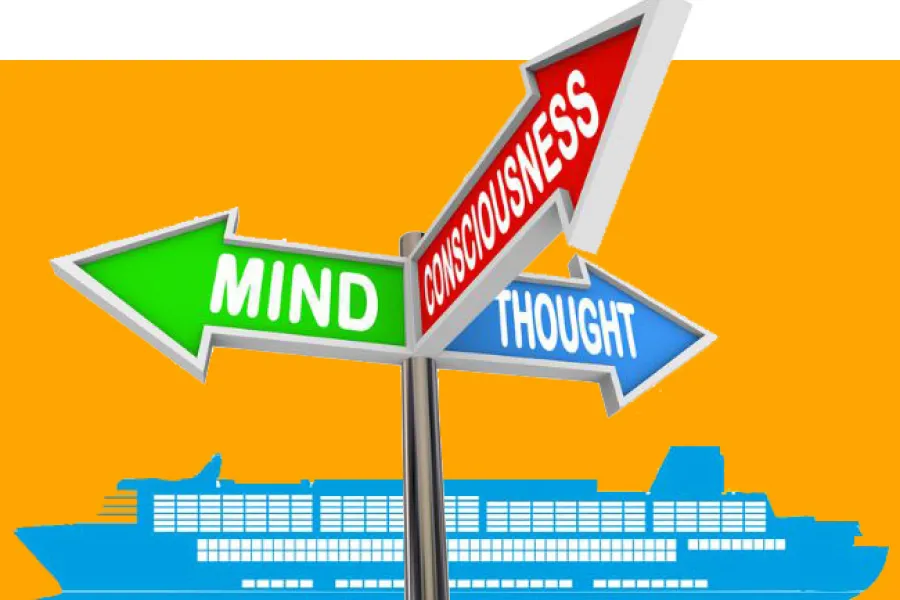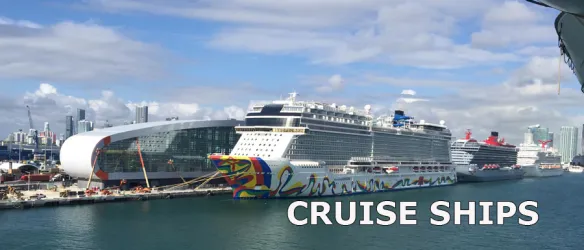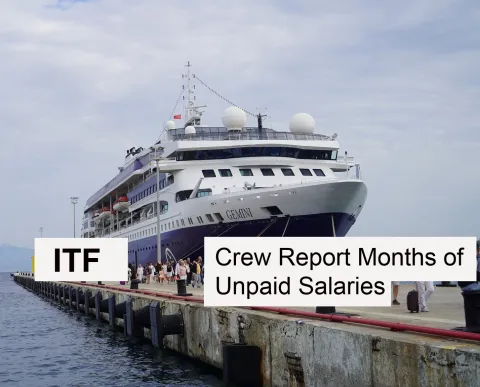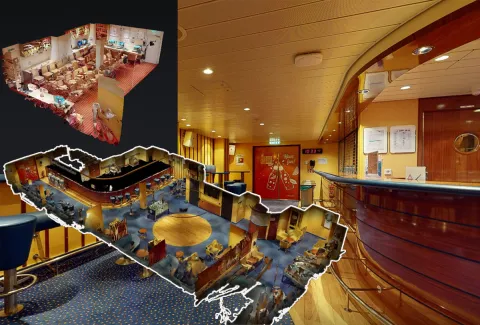
The need for mental health professionals on board cruise ships is enormous and for many reasons that are sometimes apparent, other times very much covert. The apparent reasons are simple and borderline common knowledge and understanding. The covert ones are a bit of a mystery to the public eye as most often people do not see or even understand what happens behind that door that says crew members only. How many times have I been asked how I “get to work if I you’re from so far away?” Yes, we all have been asked that before and for a moment of amusement we may tell a guest that we’re brought in by helicopters in the middle of the night while the guests are asleep. That amusement surely got me in trouble once, but for a moment of sheer humanity, it was absolutely worth it. Now let’s dive into the reasons why mental health professionals are imperative on board cruise ships.
1. Enclosed Environment
Humans were not designed to maintain in enclosed spaces for long periods of times without exposure to sun or the elements of the weather and climate. Even during harsh winters or cold weather in states such as Michigan, Washington State, Alaska, etc. due to people spending most of their time indoors can suffer from something called seasonal depression. Okay, so what? If it is seasonal caused by lack of sun exposure and being enclosed, once out this is done. Well, not really. Just think of contributing factors that over the course of the time can significantly alter a person’s mindset and train of thought. In other words, over the course of the time, seasonal depression can develop into depression or major depressive disorder. We are designed to need the sun and exposure to nature. Often crew members spend a lot of time on the ship preferring sleep after long shifts over going out on any of the ports to get that sun exposure. This does not mean that every crew member is going to experience any of this as other factors can be involved such as family history of depression, trauma, conditions, etc. However, the enclosed factor increases the chance for a person to experience some form of depression and dependent on other factors, even anxiety.
2. Inappropriate nutrition or malnutrition
Another reason is either malnutrition due to working too much and/or inappropriate nutrition. While when I get home from work I am able to prepare myself a healthy, well-balanced, nutritional meal that includes all of the appropriate food groups with wholesome ingredients, crew members on board cruise ships do not have the same luxury. Although there is more food than anyone would know what to do with, often the meals are not the healthiest well-balanced meals. In the event that you also have a genetic mutation which prolongs the breakdown of enzymes or maybe a medical condition that places you in the realm of specialized diet, well you may just be out of luck. It is not as if you can go to the grocery store and chose organic foods or go to the restaurant and order a meal that is fit for your needs. What you see on the food line is what you get. I still remember how my own mother would feed me until I am looking like an oompa loompa just so I would have enough fat deposit to waste once back on a ship again. Appropriate nutrition provides a person with all of the much-needed vitamins, proteins, healthy fats, fiber, etc. for healthy well-balanced mental health state and mood and this is often based on the individual as we are not all designed the same.
3. Work/rest balance
Possibly the most significant factor for decline of mental health state of a person is the inappropriate work/life balance ratio and quality in high paced jobs/careers. However, when it comes to crew members this is taken one step further as crew members practically do not have a life onboard cruise ships. This is often due to their jobs becoming their life. Thus, it boils down to work/rest balance which is even more severe factor than the one previously mentioned. Crew members work an extensive amount of hours in high intensity and paced, as well as most often very physically demanding and taxing jobs. How many of you can you remember the 45-minute sleep, eat, do laundry, call your loved ones for “I’m alive” session and smoke break? How about the 15-minute power nap where ever you can lay your tired body or standing works, too. I remember especially during consecutive sea days sleeping barely few hours per day. Today, looking back I can say that it gave me the ability to sleep anywhere regardless of what is happening around me. Oh, the world is falling apart…that’s alright, I am snoozing standing up. But in all seriousness, on average the adult body to rejuvenate physically and mentally needs about 8 hours of quality sleep and emphasis on quality! The average sleep onboard cruise ships barely 3-5 hours most often in an incremental manner (i.e., cut throughout the day). And if you are one of those most adamant people who are up for the challenge of exciting exploration and travel “I want to see every port” or have a social and romantic life reduce that to less than 3!
4. Basic human rights and freedoms
Feeling less than human after a while is the kicker in the cycle of mental health status decline. This starts with partitioning from a person’s simple pleasures in life. What I mean with this is that when a person lived and worked on the land before embarking the sea life, that person most likely had hobbies, events like to go to, etc. This diminishes on cruise ships for crew members as their options is the small gym, crew mess, the bar and for the officers and staff member more freedom to go to the guest areas as long as they do not lax themselves too much and get in trouble. The restrictions of freedoms is definitely another one that can make a person less than human. Every ship has strict policies and this does not stop if you go to your crew cabin. When I get home, I get to do whatever I want to do. If I do not want to clean my house because I am tired, no big deal. There is no one to come and do an inspection of my place and me in panic to hide my cucarachas. Just joking, no cucarachas in my home…ship life beat that sense of higher cleanliness into me. But the point is the same, I can choose what to do while when I worked on ships there was not much I could have made a choice about as it was one little mistake and the likelihood of being sent home is high.
5. High work-related stress and overt/covert abuse
The previously four mentioned are just the apparent ones, the startups. However, there is so much more when it comes to working and living on a cruise ship. Just as everywhere in the world, even on land, you will work with amazing supportive people and leadership and other times will work with people you can barely stand and are overtly or covertly borderline abusive. While on land most often people are protected by labor laws, on ships all are aware why the ships are registered in the countries they are. The labor laws most often protect the corporation instead of the worker. High work-related stress is often related to issues with supervisors and management who treat crew members as trash that was found on the street. This may be due to poor communication, poor leadership skills, and lack of understanding and knowledge related to coordination within a team, unless we are talking about a person’s personality and tendencies which is a whole another piece on its own. But even this is not the worst one. The worst is ultimately the consistent abuse that crew members experience from various sources starting from their supervisors, managers, leadership, roommates and even guests. In one day I counted one of my supervisors utilizing psychological abuse throughout the team more than 27 times with a focus on females. And while females are also at higher risk and exposure on cruise ships to sexual harassment and sexual abuse in general, men are not immune either. And while all of these can or at least once in their lives have been experienced even by people who work on land there is one great difference that exacerbates the issue. Today, when I am done with work I go home where my supervisor, coworkers, and clients are not privy to my life and I can separate my work and personal life. Onboard cruise ships this was not a possibility as the people you work with you also live with. The same supervisor that may have been harassing you at work is the same one that is trying to buy you drinks and coercing you into having sex with him. If you are experiencing any form of abuse, please educate yourself on coercive control and seek help as soon as possible via HR, friends, hotlines, and even contact corporate.
6. Extensive separation from loved ones, changes, life milestones, ect.
And I did not even get to miss your family and friend who would know what to do and say when you are not feeling your best. The people you wish you can share every tear and exciting moment in life. The freedom is exciting for about a month or two, but afterwards the longing and need for that unconditional love, support, acceptance, and understanding starts to sink in on a cruise ship. This is especially hard during significant life-altering events such as birth of a child, illness in the family, death in the family, separation, legal actions, breakups, divorces, happy celebrations, etc. Even the basic of “happy birthday to myself, again” can bring about to significant sense of loneliness and disconnection. While for a lot of developed countries crew members cruise ships is a rite of passage and a way to explore the world without paying a bulk of money for it, for crew members from developing and third world countries this is their profession as they do make a lot more on cruise ships than they would ever at home. They support entire families and contracting on cruise ships is not the 1 or 2 contracts, it is until they retire or until they cannot physically or mentally do this type of work anymore. For this specific population especially, it is imperative to have access to some mental health services with transitional life changes as mentioned above.
7. Onboard physicians abilities
Now I know what the response will be, well there is an onboard physician. On average a general practice physician receives a small amount of training when it comes to mental health. On average the standard is a rotation during a residency and a rotation can be up to several months. While mental health professionals focus their entire education, training, residency, and practice on assessing and treating mental health, behavioral, and psychiatric issues and disorders. The onboard physician cannot do mental health treatment (i.e., psychotherapy) whatsoever other than small dose basic prescriptions of anti-anxiety and depressants. Furthermore, when it comes to more severe cases where the person may need to be either placed on emergency rest, hospitalization and or being sent home due to mental health issue general practice physicians do not have the training for assessment and determination unless the person says the right words. However, this is not always the case especially with people who have intent and plan to commit suicide. Just imagine a person sitting in front of you who has learned how to smile and say that everything is alright, yet deep in their mind they are thinking about the pills they have stashed somewhere or the sheet they have been knotting to wrap around their neck. In that person’s mind, there is no hope and there is no way at that moment. The only hope and way to stop the pain in their mind is to end it. Mental health professionals are trained to notice that one part that people say “something was off, but could not put my finger to it. I just thought they are having a day off.”
Crew Insights
Articles and experiences shared by crew members working on cruise ship. Find out more about ship life at sea together with tips and advices for first time crew members and cruise oldtimers.












